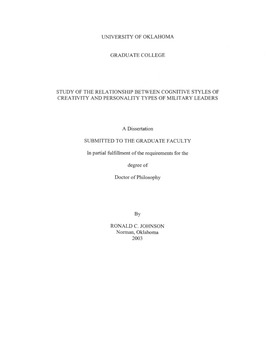| dc.contributor.advisor | Van Gundy, Arthur B., | en_US |
| dc.contributor.author | Johnson, Ronald Charles. | en_US |
| dc.date.accessioned | 2013-08-16T12:19:15Z | |
| dc.date.available | 2013-08-16T12:19:15Z | |
| dc.date.issued | 2003 | en_US |
| dc.identifier.uri | https://hdl.handle.net/11244/670 | |
| dc.description.abstract | Military leaders have experienced a cognitive paradigm shift in preparing for war. Since the Gulf War in 1991, the United States military has participated in operations other than war (OOTW) with greater frequency than before (Franke, 1997). These missions include peacekeeping operations in the Balkans and Sinai, humanitarian support for victims of natural disasters, and the post-September 11th global war on terrorism. Military leaders, now more than ever, must be able to make the cognitive leap required to meet the challenges posed by these ever-changing and unorthodox missions and environs. | en_US |
| dc.description.abstract | This study replicated previous research that has examined the cognitive styles of creativity as measured by the KAI and personality types as indicated through the MBTI (Carne & Kirton, 1982; Gryskiewicz & Tullar, 1995). This was the first study known by this researcher to look specifically at a sample of military leaders in order to replicate the aforementioned studies. Two psychometric instruments were used in this study: (a) the Kirton Adaption-Innovation Inventory (KAI) and (b) the Myers-Briggs Type Indicator (MBTI). The findings demonstrated that a statistical significant relationship existed between Kirton's innovative creative style and the Myers-Briggs personality type of intuition and perception. Additionally, a relationship was found for the KAI score for innovation and the MBTI preference for extraversion. Military leaders were also discovered to be utilizing a more adaptive style of creativity (Metter, 1989) and had a preponderance of a particular personality type. As a result of this study, one could argue that styles of creativity coupled with an individual's personality type are both relevant factors when examining military leadership. | en_US |
| dc.format.extent | vii, 88 leaves : | en_US |
| dc.subject | Psychology, Personality. | en_US |
| dc.subject | Sociology, Individual and Family Studies. | en_US |
| dc.subject | Psychology, Industrial. | en_US |
| dc.subject | Command of troops. | en_US |
| dc.subject | Creative ability. | en_US |
| dc.title | Study of the relationship between cognitive styles of creativity and personality types of military leaders. | en_US |
| dc.type | Thesis | en_US |
| dc.thesis.degree | Ph.D. | en_US |
| dc.thesis.degreeDiscipline | Department of Communication | en_US |
| dc.note | Adviser: Arthur B. Van Gundy. | en_US |
| dc.note | Source: Dissertation Abstracts International, Volume: 64-10, Section: A, page: 3859. | en_US |
| ou.identifier | (UMI)AAI3109065 | en_US |
| ou.group | College of Arts and Sciences::Department of Communication | |
